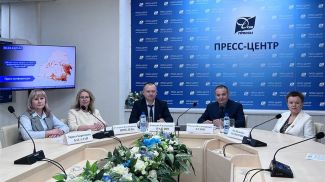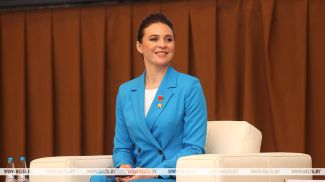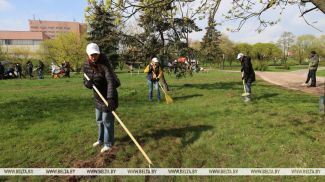Every new life is a miracle and an eternal mystery of the universe. Doctors in maternity hospitals are like wizards who help keep new life in the womb ticking and who are the first to welcome a helpless little lump to the world. But, unfortunately, not all cases are easy... Few people know about colossal efforts and extreme concentration of OB/GYN teams during delivery and the cost of miraculous life-giving medicine that gives newborns a chance to live.
They are on medical alert 24/7, without days off and holidays: obstetricians, gynecologists, anesthesiologists, resuscitation specialists and, of course, the management of Vitebsk Oblast Maternity Hospital.
Alina Grishkevich, a member of the Board of the Belarusian Union of Women, a BelTA journalist, continues a series of reports to mark the Year of People's Unity, the 80th anniversary of the beginning of the Great Patriotic War and the 30th anniversary of the Belarusian Union of Women, with a story about Lyudmila Roslik, a doctor by calling, a member of the Belarusian Union of Women, Deputy Chief Physician for Medicine of Vitebsk Oblast Maternity Hospital (that has 100 years of history). Today this maternity hospital admits only pregnant women with COVID. It delivered Belarus' first baby from a mother with COVID-19. Since the beginning of the pandemic, the hospital has not had a single COVID-19 case in newborns. By the way, Belarus' 2021 first baby was also born here.
Newborns from 780grams to 5.3kg
Lyudmila Roslik has delivered thousands of babies. If they decided to get together, there would be no assembly hall to accommodate them all.
Very difficult cases have a positive outcome largely due to the tremendous experience, the highest professionalism of Lyudmila Roslik and her colleagues. Throughout her professional career, she has delivered babies weighing from 780 grams to more than 5 kilograms.
Lyudmila Roslik delivered her career smallest baby in the pre-Covid period. Preterm birth occurred at about 27-28 weeks. The situation was extraordinary - the woman was admitted to the hospital when her waters already broke. Mechanical ventilation, an incubator, a special drug… As a result, a 780-gram palm-sized baby has survived.
As for ‘large' newborns, they owe their weight, according to experts, to mothers' high blood sugar levels, diabetes too. Almost always such pregnancy ends with a C-section. After birth, such newborns are under special supervision.
The largest baby in Lyudmila Roslik's career weighed 5.3kg.
Such cases require an instant decision which saves the life of mother and baby. Doctors fight selflessly for their lives and health. Also much depends on government investments into expensive medicines that can cost as much as thousands of dollars, and advanced equipment of maternity hospitals. But the government does not spare money on this, because this is about a future generation, the future of the nation, and hence of the state.
Triplets
There were triplet cases in the career of Lyudmila Roslik. Such pregnancies always require a cesarean section. Two boys and a girl from such a family have already grown up. They study well, making their parents proud.
However, there were very difficult situations too. For example a father of triplets, instead of welcoming such an addition to the family, recognized only one of the three... The mother, who was a student then, did not plan the pregnancy and thus found herself in a very precarious situation. Not only did her academic future hung in the balance (she did eventual graduate), she also lost the support of the babies' father. But this story had a happy ending. A few years on Lyudmila Roslik had a visitor: "Do you not remember me? You delivered my children." The woman has not only graduated from the university, but got a second degree, got married and gave birth to the fourth child.
Professional biography
Lyudmila Roslik is an obstetrician-gynecologist of the highest qualifications category with 35 years of experience. In 1986 she graduated from Vitebsk State Medical University. She worked in Liozno Central District Hospital for three years, and since 1989 in Vitebsk Oblast Maternity Hospital. For many years of fruitful work, high professionalism and great contribution to medical care, she was awarded the badge of excellence and, in 2020, the title "Person of the Year of Vitebsk Oblast".
In 2019, she introduced surgeries of a high degree of complexity, performed more than two hundred complex and high-tech reconstructive gynecological operations, which helped preserve the reproductive health of many women and improve the quality of life and ability to work.
Lyudmila Roslik works hard to strengthen reproductive health, protect motherhood and childhood, and reduce the incidence of illness among pregnant women and newborns. Largely due to this, the maternity hospital has achieved major quality indicators: the survival rate of newborns with extremely low and very low birth weight is 100%, zero early neonatal mortality. The share of premature births has decreased; there are no cases of maternal and postoperative mortality. Pre-abortion counseling has become mandatory, which has led to a significant reduction in the number of abortions.
Although this woman looks soft-spoken and gentle, she is tough and resolute to take critical decisions in a split second when it comes to the life of a mother and a baby.
Doctors always bear responsibility for a patient's life. The way doctors do their job came to play a crucial role during the COVID-19 pandemic that stormed into our lives and started wreaking havoc around the world. This pandemic put mothers-to-be and newborns at a huge risk.
The pandemic emerged out of the blue and hit the global healthcare system hard dividing the life into ‘before' and ‘now'. Everyone is looking forward to the time when the pandemic becomes a thing of the past.
Dynasty of doctors
Lyudmila Roslik came from a family of healthcare workers. She was born in Leningrad where her parents, both of who were Belarusians, studied. A native of Mogilev, her father studied at a military university, while her Borisov-born mother was a medical student. It so happened that Lyudmila Roslik followed in the footsteps of her mother, who for many years worked as a pediatrician and was the chief medical officer at a children's hospital in Vitebsk. Her elder brother was an anesthesiologist, worked at a research institute in Moscow, but, unfortunately, passed away very young.
According to Lyudmila Roslik, her mother's profession greatly influenced her career choice. “When your family members are doctors and you grow up listening to medical stories, it has a great impact on you as you start living and breathing it, too. And I also inherited my mother's respect and love for people. She would always say that people should be loved and respected and helped. Therefore, when I finished school, the choice of a university was absolutely obvious for me - Vitebsk State Medical University,” she said.
The study was interesting and flew by. She was surrounded by like-minded people who were also absorbed by medicine. She met her soulmate while working in Liozno where she got her first job as part of the mandatory work placement program. It was 1987-1989.
The town was located 40 kilometers from Vitebsk. She commuted there together with construction workers whose company bus also picked up a group of young doctors, among whom was a young dentist from Vitebsk.
Slender, fair-haired and blue-eyed Lyudmila Roslik immediately caught the eye of the young dentist. She was petite, athletic and fast-paced – no wonder as she was fond of orienteering and skiing. He, in turn, was almost two meters tall. Though, as they say, opposites attract.
At that time they were only 24 years old. They were full of hopes and dreams, in love with their work, cheerful and lively. They were on the same wavelength and enjoyed spending time together... Three years passed before they made up their mind to tie the knot. It took them a lot of time to arrive at that decision, but it turned out to be right. They are still a happy couple loving and supporting each other throughout their journey of life.
After the wedding, they first lived with Lyudmila Roslik's parents, then rented an apartment and finally bought their own home. She still remembers that thrilling and wonderful moment when she realized that she would also become a mother. Lyudmila Roslik was then 31 years old.
Memories of that time are mostly happy. However, her profession had a flip-side: while being pregnant she had to perform abortions. That was part of her job. Unfortunately, at that moment none of her more experienced coworkers told her not to do it. Back then the number of abortions was large, and the expectant mother was frustrated about it.
Since then, she no longer performs abortions. However, she goes to the operating room if there are difficult cases requiring her consultation. She has the most negative attitude to abortion, with the exception of termination of pregnancy for serious medical reasons. As statistics show, every fourth woman changes her mind to terminate pregnancy after a consultation with a doctor in family planning offices in antenatal clinics of Vitebsk. Here doctors are assisted by representatives of the Caritas Catholic charity who worked closely with doctors before the pandemic.
Lyudmila Roslik's family - husband and daughter - are doctors, too. By the way, her brother-in-law and his children also work in the healthcare sector in Minsk.
Daughter Kristina, like her dad (who works as an orthodontist, department head), chose dentistry and after graduating from Minsk State Medical University she has been working as a dentist in one of Minsk clinics. And on weekends she comes to Vitebsk to visit her parents.
Lyudmila Roslik is happy that her daughter followed in her footsteps and became a doctor. By the way, her daughter represents already the third generation of doctors.
Lyudmila Roslik enjoys spending time on her dacha, where she can enjoy taking a steam bath and recharging her batteries close to nature. Together with her husband and sometimes with friends, some of who she has known since school, she goes to the forest to wander, pick mushrooms and just enjoy the beauty and charm of nature at any time of the year.
They also try to help in every possible way the elderly parents of her husband who live in Stolbtsy.
... For 16 years, Lyudmila Roslik took care of her mother who was paralyzed after a stroke. At some point she found herself overwhelmed by the great amount of work she had to do – to look after her sick mother who needed round-the-clock attention, to take care of her daughter who was about to go to school – and this all in addition to full-time job and household chores.
As Lyudmila Roslik's colleagues say, she never complained of having a hard time. Though everyone who has ever taken care of a paralyzed relative knows how hard it is, physically and psychologically. She went through it with dignity.
Expectant mothers with COVID-19
COVID-19 is on everyone's lips today. As soon as the pandemic hit, Vitebsk Oblast Maternity Hospital has been repurposed to provide medical care for pregnant women with COVID-19 from the entire region.
“Coronavirus has been with us for a long time already and in general we have clear protocols in place. Of course, COVID-19 is a novel coronavirus infection. At the very beginning many things were unknown. However, we simply did not have much time to think it over. Patients, their wellbeing and emotions are right here and now, and their treatment cannot be put on hold. Especially when we talk about our special patients - expectant mothers and newborns,” Lyudmila Roslik said.
Obstetricians and gynecologists in Vitebsk, and Belarus in general, quickly developed a number of protocols, some of which differed from the recommendations of the World Health Organization.
No COVID-19 cases in newborns
The first baby, born in Belarus to a mother with COVID-19, came into the world in the Vitebsk maternity hospital. The baby was absolutely healthy, which proved that the strategy chosen in a new epidemiological situation was the right one.
“We came to the conclusion that a mother with the coronavirus could infect a newborn through breastfeeding. We decided to place newborns in an incubator and keep them there for some time under medical supervision,” Lyudmila Roslik said.
This principle ran contrary to the WHO that recommended against separating newborns from their mothers immediately after birth. However, as practice around the world showed later, this WHO strategy did not prevent infants from contracting the infection. WHO subsequently changed its postnatal care recommendations in favor of the tactics initially chosen by Vitebsk obstetricians and gynecologists, which can be viewed as another proof of their high professionalism and considerable experience.
As a result, there has been not a single case of infection in newborns in Vitebsk Oblast Maternity Hospital. The doctors believe that the decision to separate mothers and newborns, as well as some other operational measures, largely contributed to such an outcome.
Strong discipline
“The hospital worked as a close-knit unit in this difficult period,” Lyudmila Roslik said proudly. “Observation of all rules and regulations is very strict here. The use of personal protective equipment. Red zones and clean zones. If you leave the red zone for lunch, you use new PPE. From the very beginning we were fully stocked with overalls, respirators, shields - all the necessary protective equipment. We were supported by the Vitebsk Oblast Healthcare Department, city and regional enterprises, especially sole traders, and, of course, our chief physician Yelena Leonovich. She deserves much credit for the well-organized work.
Since the virus activity is characterized by waves, it may seem possible to feel slightly at ease at some points. However, Vitebsk obstetricians and gynecologists are not going to let their guard down.
The main feature of an effective professional team is a low rate of complications during delivery and the absence of infants in intensive care. This requires hard work and commitment as it is important to catch the slightest symptom of a possible disease in time. Comprehensive pregnancy monitoring amid the coronavirus pandemic is an extremely complex process. Maternity care in such extreme situations must be personalized and require extensive expertise. Although the medical staff is prepared for different situations, we always support each other in every possible way, working as one team, Lyudmila Roslik said.
Extremely preterm infants
Premature babies are a separate topic of our conversation. Lyudmila Roslik said that mothers with the coronavirus infection account for a significant number of premature births. This does not depend on the age of the mother. Premature births can occur in both young and older mothers. All depends on the severity of the disease.
There was a case when an expectant woman in the 28th week of pregnancy was urgently admitted to hospital with severe pneumonia. Timely examination of the mother-to-be allowed for necessary measures to be taken to save the baby.
Very preterm babies, whose lungs cannot make it on their own, are treated with a special expensive drug, which is injected through the trachea within first 5-10 minutes of life. These drugs are purchased by the government, which is a global practice. Then the newborns are kept on a ventilator for some time.
Of course, this is a very stressful situation for the mother. Sometimes there is a need for psychological help. Therefore, they are all the more happy when everything is over and they can take their babies home.
The hospital staff is always attentive to expecting women. This is why many mothers come back to the same maternity hospital to give birth to their second, third child, and sometimes even more.
Three cigarettes costing a life
Cases when expectant mothers smoke, drink, and then give birth to children with defects are unfortunately not uncommon. This is a real tragedy for society.
Of course, smoking is not allowed in hospitals, especially when it comes to maternity care. It is a universal rule. But not everyone follows it. There were cases when doctors smelled cigarette smoke in wards during medical rounds.
Today, all the wards are equipped with smoke alarms that detect cigarette smoke and alert the relevant agencies. There was a case where a mother-to-be decided to have a smoke in the ward. She was very much surprised to see a firefighting service arrive and fine her. That situation taught everyone a good lesson.
Lyudmila Roslik brought up a tragic story when a mother's smoking during pregnancy killed a healthy and mature infant. The doctor was in charge that day. It happened in the pre-COVID time, and expecting women used to go for a walk on the grounds of the maternity hospital. A group of women went outside for a smoke. During a medical round the doctor could not hear the heartbeat of an infant of one the women. The mother was 35-36 weeks, and the baby should have been born on term. The woman smoked three cigarettes within 30 minutes. Three cigarettes cost her baby's life…
Lying on the stomach for a month
All expecting mothers are different. The majority of them are responsible women who are taking care of their babies and following doctor's orders. Healthcare workers are truly fascinated by the women who do the seemingly impossible to give birth to a healthy and wanted baby.
As an example, Lyudmila Roslik mentioned a swimmer who was pregnant in the COVID time. She was admitted to a maternity ward in a serious condition with double pneumonia. Her good physical shape helped her fight for the health and life of her child. She could breathe without ventilator assistance thanks to a high lung volume of a swimmer. She spent a month in a maternity hospital lying almost all the time on her stomach and thus saved her baby. The woman displayed true courage and endured everything for her child.
Not long ago a 40-year-old birthing woman was brought to the maternity hospital from a district capital. Because of COVID there were risks to the baby. However, thanks to the concerted efforts of doctors the delivery went well. Words are not enough to describe the happiness of women who become mothers in the most difficult situations.
The youngest mother was 11 years old
Sometimes there are extraordinary situations like, for example, giving birth at the age of 11. The case happened when Lyudmila Roslik was a young doctor at the beginning of her career. An 11-year-old girl was terrified and did not fully understand her condition. The parents gave their permission for hospitalization and assisted childbirth. Сaesarean section was performed. It is unknown what happened to the young mother afterwards.
“I think that if parents take good care of their children and talk about sexual education and health to them, such thing should not happen,” the doctor said. “Thanks God, I haven't had cases like that in my career since then.”
The oldest mother was 50 years old
A woman got married and became pregnant with a much-wanted child at the age of 50.
Lyudmila Roslik believes that such things should ideally happen earlier, at a younger age when a woman is in the prime of her life. However, the world has changed, and birthing women become older. Doctors are not super happy about that because the risk of genetic malformations in a child who was conceived when a mother was older than 36 years and a father was older than 45 years is increasing. However, as the saying goes, it depends.
“No one can say for sure what is right. It is good when a young woman is lucky to marry a loved and loving man who wants to have a family and a baby,” the doctor said. “Every person makes a decision depending on their situation. I do not criticize anybody. When I was younger, I would have, probably, said that a baby should be born in a two-parent family. Today I would not say that. Many smart, beautiful and independent women do not find a partner and do not get married. Unfortunately, it happens. I think that if an unmarried woman wants to become a mother, it is absolutely normal.”
“I am a rather conservative person, and I think that a woman needs to realize herself as a mother, as a wife, as professional. However, there are different situations, and every person is free to choose their own path and destiny,” Lyudmila Roslik said.
Call for responsible motherhood
“I am in favor of responsible motherhood,” Lyudmila Roslik said when speaking about many factors. “I mean that a future mother should have a responsible attitude to her own life long before pregnancy. I am referring to a healthy lifestyle, healthy food, pregnancy planning. A woman planning her pregnancy must consult with an obstetrician-gynecologist who will give recommendations regarding a healthy lifestyle and nutrition with a balanced mix of proteins, fats and carbonhydrates. Food rationing, vegetarianism, a sedentary lifestyle do not contribute to efficient fetal development. Balance is important, any extremes can have a negative impact.”
According to Lyudmila Roslik, excess weight of a woman can hinder conception, and weight reduction might help.
There are serious health conditions when pregnancy is not medically advisable. However, women sometimes do not listen to doctors' recommendations…
Another problem is the interruption of pregnancy. Unfortunately, young girls do not always understand that the interruption of the first pregnancy and abortion in general can have irreversible consequences (let along ethical aspects). One abortion can cause infertility.
About emotions at work
“This is everyday work. It is good when everything is okay. However, there are many stressful situations because every case is unique, especially now when we work with COVID patients,” the doctor said. “Our hospital is a tier-three institution, and we cater to birthing women with serious pathologies from all districts. We need to act quickly.”
Medical teams of OB/GYN, an anesthesiologist, an emergency physician, work with every woman. For example, giving birth to a big infant, multifetal and frequent pregnanciescan raise the risk of bleeding. Obstetrical bleeding is voluminous, a woman can lose up to 1 liter of blood within 10 minutes. Therefore, teams of qualified doctors are doing their best day and night…
About miracles
Of course, doctors sometimes witness true miracles. You call it a miracle when women with different medical conditions get pregnant against all odds. Not all things can be explained by science. “The desire to become a mother often work wonders,” Lyudmila Roslik said.
What coworkers say about her
Lyudmila Roslik's coworkers describe her as a person of high morals, a decent, intelligent, responsive and very honest person. This is very important when the team includes people who honestly talk about how they see the situation and how the right decisions should be made for the sake of the common cause. Highlyprofessional assistance to patients trumps the satisfaction of personal ambitions. The coworkers say she will not stand aside, she will forge ahead. “She is honest in everything. A true person and a doctor through and through," they say.
Such words mean a lot.
Headphysician
The head physician Yelena Leonovich is described as a good doctor and an excellent business administrator, which is a great compliment for a woman executive. She roots for the team and stands up for her employees. Everything that can be done for the maternity hospital is done wisely. When in 2016 all the women's clinics of the city were attached to the oblast maternity hospital, the head physician personally supervised constructionprogress, landscaping and beautification. She stayed on top of the construction workers and left her high-spirited deputy in charge of all the medical matters. Keeping everything shipshape is a matter of honor for her. The maternity hospital is framed by a well-groomed landscaped area with flower beds and the flowers delight everyone with bright autumn colors.
When talking about her deputy, Yelena Leonovich said: "We have been working together for 16 years. She has taken part in lives of more than 1,000 women. Correct and competent treatment helps achieve positive results. Obstetrician-gynecologists do not like the word ‘save'. Our job is to treat. Pregnancy is a normal physiological state for women. In our current conditions 90% of the women have complicated pregnancies, some are mild, some are of moderate severity. A correct tactic can lead a pregnancy to fruition."
About the maternity hospital
Vitebsk Oblast Maternity Hospital was inaugurated 13 years ago by Belarus President Aleksandr Lukashenko. He visited the hospital once again in 2021. It was kind of an exam for the team. They had to show and tell him how public funds had been invested.
The visit turned out to be positive. New equipment was acquired for the medical institution afterwards. In particular, the hospital received an expert-class ultrasound machine that allows monitoring intrauterine development and the condition of newborns.And most importantly it allows diagnosingdevelopmental defects in newborns at an early stage and promptly raising the issue of correcting these defects at the stage of delivery.
The new laparoscopic stand for minimally invasive surgical gynecological operations for a variety of diseases turned out to be very handy.
The equipment upgrade is a continuousprocess.According to employees of the maternity hospital, the intensive care unitreceived a high-quality anesthesia machine in late 2020.Thanks to international funds, the children's department has updated equipment for newborns - new incubators and ventilators have been purchased.
The maternity hospital also received a modern monitoring station for incubators.It allows doctors to remotely monitor all newborns from a central station in real time, receive alarm notifications, and view stored data.
"Healthcare cannot use outdated technologies. To keep up with the times, to provide modern medical care, it is necessary to change the equipment stock in a timely manner," the hospital management believes.
A bit of statistics
Obstetrics takes care of two lives at once. Maternal mortality and child mortality rates are leading indicators of living standards as well as the quality of the healthcare system. These indicators reached a historic low in Belarusin 2020. The infant mortality rate in the country corresponds to the European Union's average. In terms of infant mortality Belarus is ahead of all the CIS countries and many developed countries of the world, including the UK, Denmark, Lithuania, Poland, and the United States. The survival rate of children with an extremely low weight in the first year of life exceeds 80%. The primary disability rate among this category of children does not exceed 17-18%.
Belarus is the first country in Europe and the world's third country (along with Cuba and Thailand) to reduce mother-to-child transmission of HIV and congenital syphilis to a level that does not pose a threat to public health. A multilevel system of maternal and child healthcare has been successfully functioning in the country for more than 20 years. The legislatively enshrined priority of providing medical care to mothers and children and a well-structured system of assistance, state measures of social support for mothers and families with children made it possible.
The most beautiful newborns
“We have the world's most beautiful newborns,” employees of Vitebsk Oblast Maternity Hospital say.
Babies being discharged from the hospital are photographed with the words "Vitebsk is the city where I was born" in the background. A beautifully decorated room almost at the very exit from the hospital is a place where fragile and precious parcels with newborn boys and girls are carefully transferred into the hands of relatives and friends, newly-made daddies. These moments are always very touching and represent adorable scenes of indescribable happiness. Not only for relatives.
But also for the medics. These moments are the meaning of their entire lives. They are not politicians, they are medics. It turns out they assess values of the state by what the state does for the good of people, how much money the state allocates for healthy motherhood and childhood, for acquiring modern equipment for diagnostics and treatment, for acquiring those precious medications that can give life to premature babies. A lot is done in Belarusfor this. That's all the politics there is.
By Alina GRISHKEVICH,
BelTA











